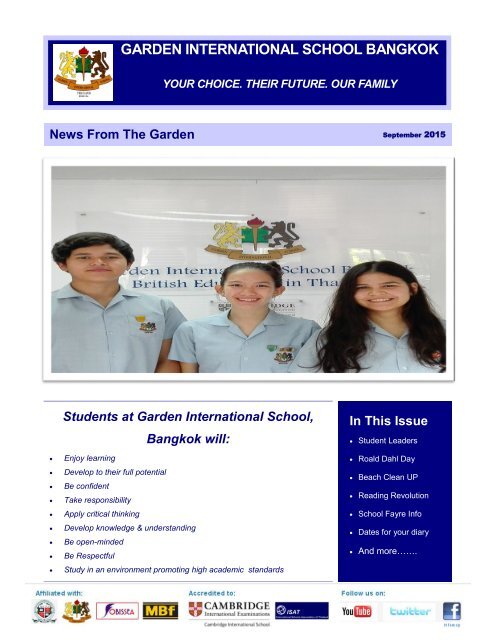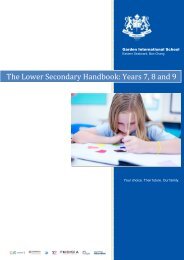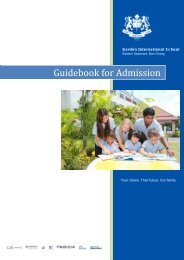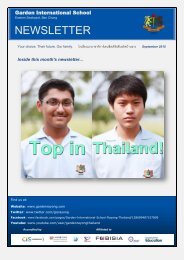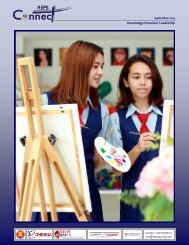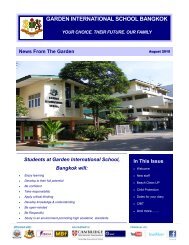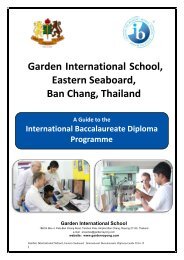Newsletter September 2015
- No tags were found...
You also want an ePaper? Increase the reach of your titles
YUMPU automatically turns print PDFs into web optimized ePapers that Google loves.
GARDEN INTERNATIONAL SCHOOL BANGKOK<br />
YOUR CHOICE. THEIR FUTURE. OUR FAMILY<br />
News From The Garden <strong>September</strong> <strong>2015</strong><br />
<br />
<br />
<br />
<br />
<br />
<br />
<br />
<br />
<br />
Students at Garden International School,<br />
Bangkok will:<br />
Enjoy learning<br />
Develop to their full potential<br />
Be confident<br />
Take responsibility<br />
Apply critical thinking<br />
Develop knowledge & understanding<br />
Be open-minded<br />
Be Respectful<br />
Study in an environment promoting high academic standards<br />
In This Issue<br />
Student Leaders<br />
Roald Dahl Day<br />
Beach Clean UP<br />
Reading Revolution<br />
School Fayre Info<br />
Dates for your diary<br />
And more…….<br />
1
Principal’s Message<br />
It is hard to believe that as I write to you at the end of <strong>September</strong> that we have already had over 16% of our academic<br />
year. Time flies when you are having fun!<br />
In the time I have been at Garden International School, Bangkok I have realised what a very special school this<br />
is. We have innovative and experienced teachers, inquisitive and polite students, hardworking and dedicated<br />
administrative staff and an engaged and passionate parental body. Together it makes a very powerful team.<br />
During <strong>September</strong> we have seen the school spring into life with the start of activities, swimming and special<br />
events, such as Roald Dahl Day and the Beach Clean Up. A quality international education requires both the<br />
academic studies as well as the opportunities for students to grow socially, emotionally and physically.<br />
You can read in this issue about our student leaders for this academic year. I wish them well as they galvanise<br />
the student body into a coherent unit, intent on academic, and sporting success, as well as social action in the<br />
community.<br />
Students taking a lead and becoming leaders is something I am passionate about. But what is leadership?<br />
There are many different definitions and theories regarding ‘what is leadership?’, however there are two which<br />
resonate with me as being clear definitions.<br />
‘Leadership is a process of influencing others to understand and agree about what needs to be done and how it<br />
can be done effectively’ (Yukl, 2002, p. 7)<br />
‘Leadership is a process whereby an individual influences a group of individuals to achieve a common<br />
goal’ (Northouse, 2009, p. 5)<br />
Both of these definitions stress the importance of ‘influence’ and working towards a target with other people.<br />
They also both describe leadership as a process, therefore it is not something that just happens, it requires<br />
thought, planning and execution.<br />
So leadership requires influence, a goal to influence people towards and following a process to get there.<br />
October sees the first break in the academic calendar, as students (and teachers!) get a well deserved rest and<br />
opportunity to recharge their batteries.<br />
Thank you for all your continuing support.<br />
Mr. Figes<br />
Principal<br />
Northouse, P. (2009). Leadership. 6th ed. Thousand Oaks, Calif.: Sage, p.5.<br />
Yukl, G. (2002). Leadership in organizations. 5th ed. Englewood Cliffs, N.J.: Prentice-Hall, p.7.<br />
2
Student Leaders <strong>2015</strong>/16<br />
House Captains<br />
Hi, my name is Alexander Clement (Left) and I am the Captain of Kwai House. Having been in Kwai house<br />
for over 10 years now, it's a tremendous for me to now serve as the Captain of this great House. As House<br />
leader, I hope to lead Kwai by example and to always be there to support and encourage my fellow House<br />
mates to take on any challenge with the best that they can give. I look forward to leading Kwai to victory<br />
(again!) this year.<br />
Greetings everyone! I'm Lilly Purdon (Middle) and house captain of Chao Praya! I'm currently in Year 11<br />
(sophomore) and my favorite subjects are: Art, P.E., and Design Technology. Being a house captain to<br />
me, means leading my house members to happily participate at their highest level in every event, and also<br />
watering their gardens of creativity so they can bloom brightly with exotic colors. As a house captain, I<br />
want to inspire and motivate everyone to enjoy physical activites and learning.<br />
Hello, I am Nadia Gilquin (Right) and House Captain of Mekong. I am currently in Year 11 and my favourite<br />
subjects are Art and History. To me, being a House Captain means leading Mekong to participate in all<br />
activities and hopefully have fun as well as learn something new along the way. I would like to be to the<br />
House Captain that is capable of meeting my House's expectations and potentially lead Mekong to victory!<br />
Dates for your diary<br />
Thursday 1st October - ‘Maths Inspire’ - Period 1. An opportunity for parents to witness numeracy lessons<br />
in progress.<br />
Monday 5th October - Performance Exchange theatre company for Y3-Y11.<br />
Monday 19th-Monday 26th October - Half Term. School is closed and reopens on Tuesday 27th October.<br />
Friday 30th October - Whole School Halloween activities all day.<br />
Friday 30th October - Secondary Halloween disco.<br />
3
4
It is shaping up to be a great year for Year 1<br />
In recent weeks Year 1 have been learning about shapes. The children have been drawing shapes and writing<br />
about their properties. They even found some interesting shapes in our garden.<br />
Mr. Cooke<br />
Frist School Stars<br />
Each week in the First School assembly students who have done something extra special during the week are<br />
given a certificate. These certificates are awarded by the class teacher and help us to celebrate some of the<br />
great things are students are doing during the school day.<br />
5
Students at Garden International School, Bangkok will:<br />
Enjoy learning—Together!<br />
Some of our Secondary students taking part in the Carnegie book club.<br />
Reading Revolution<br />
Reading Revolution is in its second year and we have started this new term full of energy and enthusiasm. Firstly,<br />
secondary pupils participated in a lively debate on gender stereotyping. The pupils delivered very strong arguments<br />
and were pushed well out of their comfort zone. The new year 7s were particularly impressive considering<br />
it was their first whole school debate.<br />
As well as debating, the Carnegie book club has started up again. Pupils chose a book of their choice from a<br />
selected shortlist of 8. In groups; teachers and a few very helpful year 10s lead the reading and discussions.<br />
This is a very positive experience for the students as they get a chance to share the wonderful journey that reading<br />
books can offer. These book club sessions not only develop vital literacy skills but help children to communicate<br />
ideas, predict and problem solve in a comfortable and sociable setting.<br />
The Reading Revolution sessions which take place once a week is proving to be a great success, the majority of<br />
our pupils have said that they are reading much more now than before this scheme. At GIS we are trying to<br />
make reading a pleasurable routine. Reading is not only a very enjoyable past time but it helps children to access<br />
the curriculum.<br />
This term we have lots more in store; we have our big debate on euthanasia which is on October 9th, Halloween<br />
activities will take place on October 30th and The Hunger Games evening event is on November 27th. We will<br />
keep you updated with all the relevant information.<br />
Ms. Ezzat<br />
6
Roald Dahl Day<br />
Roald Dahl would have been 99 years old this year. At GIS we celebrated Roald Dahl Day on Thursday 17th<br />
<strong>September</strong>. Roald Dahl was one of the world's most popular children's authors, publishing 21 children's books<br />
(as well as many adult stories) including the well-loved Charlie and the Chocolate Factory and Matilda.<br />
It certainly was a fun packed day many pupils read or even re-read some of his stories, great outfits were worn<br />
and all students participated in exciting activities. To the dismay of many students, the famous Wonka chocolate<br />
bars were sold out within minutes and 9 lucky pupils won golden tickets!<br />
It was a fabulous day and our students were reminded how important and fun reading can be!<br />
I have a passion for teaching kids to become readers, to become comfortable with a book, not daunted. Books<br />
shouldn’t be daunting, they should be funny, exciting and wonderful; and learning to be a reader gives a terrific<br />
advantage.” Roald Dahl<br />
Ms. Ezzat<br />
7
Roald Dahl Day<br />
Alongside all of the costumes and fun there were also some student workshops based on the Roald Dahl theme<br />
that helped students to increase their skills. Secondary students in Y7-9 were involved in designing their own<br />
chocolate bars. Further to this in their Art & Design lessons the Year 7s created Willy Wonka's chocolate factory<br />
as a pop up and the Year 9s focused on Quentin Blake illustrations. Some examples of their work are below.<br />
Ms. Elnour<br />
A-Levels at GIS Bangkok - August 2016<br />
A-Levels are coming to Garden International School, Bangkok in August 2016! A-Levels are known throughout<br />
the world as being one of the finest, if not the finest, pre-university education. Here at GIS Bangkok we will be<br />
offering the international A-Levels offered by Cambridge International Examinations. By passing the A-Level<br />
examinations our students will have the opportunity to attend some of the best universities in the world, as well<br />
as Thailand. A-Levels really will open doors for our students.<br />
Currently we are starting to discuss with students their best options and during the second half of this term we<br />
will meet with parents to showcase what we will be offering and how the A-Level programme will work.<br />
8
9
Beach Clean Up Day<br />
On the 12th of <strong>September</strong> <strong>2015</strong>, the beach sweepers of G.I.S set out on a journey of self discovery. We found<br />
ourselves appalled by the amount of trash that littered the golden sands of Koh Sak.<br />
We set out on this adventure in the early hours of the morning to Pattaya and aboard Popeye the fishing boat we<br />
travelled to Koh Sak island. The boat was full of joy and mighty laughs as we set out onto the open seas.<br />
Within half an hour on the boat we finally arrived at the bay of Koh Sak. We took a dip into the deep blue to get a<br />
feel of the equipment that we had to use for the day. For an hour we had plenty of good fun, swimming around<br />
and jumping off the boat (safely).<br />
Afterwards we went to our neighbouring boat to have a wonderful buffet styled lunch. We mingled with the other<br />
participating schools.<br />
A little while after we went over to the Koh Sak bay. We were astounded by the amount of rubbish that inconsiderate<br />
beach goers left behind. Even a table was spotted underneath the ocean floor.<br />
When we returned to the port we were treated handfuls of ice cream for free, by our teacher, Mr. Rose.<br />
We thank the Mermaid Dive Center for inviting us to this mind-opening adventure that really showed how we as<br />
humans do not take care of our Earth as much as we should. We hope to be here next year and hopefully more<br />
students participating on this experience and we thank Mr. Rose, Mr. Everon and the crew of Popeye for making<br />
this all possible without them we probably go overboard and be lost at sea. Counted among the trash.<br />
Ben, Stacey and Hnin<br />
Students at Garden International School, Bangkok will:<br />
Take responsibility for their actions and the environment.<br />
10
Year 11 English Essays<br />
Our Year 11 IGCSE English class has recently been involved in researching and writing essays for an International<br />
New York Times competition. They were so good we wanted to share them with you! The students worked<br />
in groups to research their topic and construct their essay.<br />
Classes for the Disabled Masses by Alexander Clement, Anuj Gupta, Patson Tohsuwanwanich<br />
“My mother comes to school every day during lunch time. She helps me with the catheter. She never complains<br />
about anything.” This is the story of Rakhi, a thirteen year old girl, living in Mumbai, who was born with Spina<br />
Bifida. “Sometimes, I ask Mummy whether I am a burden to her. She cannot go anywhere because of me, she<br />
always keeps worrying about me. She always tells me that she loves me and I am never going to be a burden.<br />
But she cries when she says this.”<br />
Rakhi goes to an inclusive school in the heart of Mumbai and was one of the candidates chosen for an investigation<br />
into the lives of disabled school children. The investigation, lead by Professor Ashima Daz of the Tata Institute<br />
of Social Sciences and Dr. Ruth Kattumuri, the co-director of the Asian Research Centre, found that all the<br />
girls who were interviewed were, “found to be conscious of their physical self and developed a poor self image”,<br />
and as such, inhibited them from interacting with their peers.<br />
According to UNESCO, 90% of disabled children do not attend school, and the literacy rate for disabled adults is<br />
3%, 1% of those adults being women. In addition, as identified by the United Nations Enable program, “women<br />
with disabilities face significantly more difficulties in obtaining access to adequate education, employment and<br />
are more likely to be institutionalised.” This is a major cause for concern, especially in Third World countries, as<br />
these young women could possibly be a burden to their families, when they could be providing a source of income<br />
and food when given access to education. A study conducted by the Institute of Education, University of<br />
London found that at an early age, both male and female children with disabilities experienced emotional abuse<br />
at their schools, and as a result, worsened behavioral problems as they got older, “Our findings suggest that<br />
some early school environments may exacerbate behavioral problems for disabled children in ways that cannot<br />
solely be solved by learning support” The research suggested, “Many disabled children find it increasingly difficult<br />
to engage with the social world as they pass from toddlers to the mid-primary school age. They also struggle<br />
with structured social contexts such as school.” Even with access to education, these young children find it difficult<br />
to adapt to the social environment around them and as such, this affects how they behave and react to this<br />
later in life.<br />
“I have never seen myself, but my parents and friends tell me that I am very pretty. It makes me happy when<br />
people tell me I am pretty and I like this about myself”. These are the words of Simran, a fifteen year old girl who<br />
suffers from visual impairment. Similarly to Rakhi, her life has benefitted from attending an inclusive school and<br />
was another one of the candidates chosen for an investigation.<br />
Research conducted by the International Center of Research on Women (ICRW) has shown that, “women are<br />
more likely to control their own destinies and effect change in their own communities when they have higher levels<br />
of education.” What this shows is that, as the young female generation is provided advanced education, they<br />
are empowered to remove the shackles set upon them by traditional values and are capable of contributing to<br />
their society.<br />
11
Fortunately, Simran is now on a path towards a brighter future thanks to the Save the Children initiative, which<br />
aims, “to inspire breakthroughs in the way the world treats children and to achieve the immediate lasting change<br />
in their lives.”<br />
However, Abigail Hunt, formerly part of the Secrétariat Permanent des Organisations non Gouvernementales<br />
states that, “While education is undoubtedly a key element contributing to empowerment, the two do not necessarily<br />
go hand in hand.” This is because a majority of educational programmes offered to these young women<br />
concentrate on teaching and preparing them for paid employments in the future. Though it is integral that women<br />
receive this kind of training and preparation from schooling; allowing them to have the opportunity to develop<br />
confidence and grow their self-esteem means that women will become more cognizant of any decisions they<br />
make in the future relating to their ambitions.<br />
So what are the solutions? Both the promotion of gender equality and the empowerment of women is essential<br />
in order to achieve the internationally agreed upon goals, referred to as the Millennium Development Goals.<br />
Over the years, the UN has shown that advances in teaching techniques can now truly make a difference in the<br />
lives of these young women, “Significant advances in teaching techniques and important innovative developments<br />
have taken place in the field of special education and much more can be achieved in the education of<br />
disabled persons.”<br />
“But the progress is mostly limited to a few countries or only a few urban centers.” It is simply the case of implementing<br />
these techniques into schools around the world. If it were ever possible to conquer this hurdle, then perhaps<br />
children like Rakhi and Simran would no longer be overlooked and would have equal opportunities in<br />
reaching their full potential.<br />
Breaking the Chain of Child Labour by Lilly Purdon, May Bini, & Nastia Stepanova<br />
Seven- year- old Keo is awoken by a sudden shove from his mother. He pushes himself up from his stiff straw<br />
mat and puts on clothes he has worn for the past three days. His stomach is growling, but the food is given to<br />
his younger siblings. Keo takes time to comfort his eight-month-old sister before heading out the door. Not to<br />
school, but to work.<br />
“Child labor and poverty are inevitably bound together,” children’s activist Grace Abbott states, “And if you continue<br />
to use children as the treatment of social disease of poverty, you will have both poverty and labor to the<br />
end of time.” “About 218 million children are actively engaged in labor,” states ILO (International Labor Organization).<br />
That’s 14% of all children between the ages of 5 to 17, and almost 26 times the population of New<br />
York City! How many other Keos are out there? Studies also show these children are working in hazardous<br />
conditions, are being exposed to toxic chemicals, diseases, and are at risk from sexual exploitation and abuse.<br />
Many are forced to work at dangerous sites; some sites report up to 22,000 deaths a year.<br />
“Most of the progress on child labor was made between 2008 and 2012,” says ILO. Even though child labor<br />
rates have declined since, the year 2000 from 246 million, by 2013, child elimination programs had decreased<br />
the figure to 168 million. Unfortunately, these numbers have risen slightly again since this date. The ILO added,<br />
“We have set the target of 2016 for eliminating the worst forms of child labor.” Today, reports show that in<br />
some critical parts of the world the fight is in danger of being lost.<br />
12
In Sindh Province, Pakistan, the sun glares down on an open-aired brick-making factory in Shahdadkot City.<br />
Ahmed, 12 years old, works at one of the 100 kilns in his city. Unlike others, his problem isn’t waking up for<br />
school, instead, he works everyday in the scorching sun carrying lumps of mud in order to make 600 - 700<br />
bricks a day to be used in construction, “I don’t like working in the hot sun. I get very tired.” His clothes are<br />
splattered and torn and his hands are sore, burnt, dry, and overworked. “For 8 and a half hours of work each<br />
day, he earns 50 rupees,” says a Unicef’s outreach worker. This is equivalent to 30 US$ a month. Not only<br />
does Ahmed work during the day, every night he is forced to return to prepare more bricks for the following<br />
day. He has to retrieve 40 bucketfuls of water from a lake; an exhausting trip he has to make up to 40 times to<br />
complete this task. This means he earns less than Pakistan’s minimum wage per month which currently stands<br />
at 45 US dollars. Ahmed can’t afford to miss work, as he has to help support his family and feed his other two<br />
siblings.<br />
“I’d like to go to school. If I went to school, my life would be better,” says Ahmed, just one of millions of children<br />
who are exploited through labor. These words highlight an alarming situation. How can we offer equal<br />
opportunities of education to all children?<br />
Positive things are happening in the world, as many child labor elimination organizations have helped make a<br />
difference. “We have gifted education to 257,113 children by enrolling them in government schools, and have<br />
gotten 1,115 children out of child labor,” reports Hand to Hand, a child labor organization which focuses on<br />
helping children in need, to attend school. “We have also constructed 119 learning centers, 9 residential training<br />
centers, and 38 transit school for children in need.” One of their success stories includes 11- year- old<br />
Karthick, from Peenjamandhai, one of the children Hand in Hand has reached out to with their RSTC<br />
(Residential Special Training Centers) program. He originally worked on a farm with his parents and grazed<br />
cattle, which prevented him from attending school and socializing with others his age. Thanks to the RSTC<br />
program providing him education, he may be able to fulfill his dream of becoming a doctor and helping his<br />
village.<br />
“We, the future need care,” says 13- year- old house-servant Rekha Sharma. “Every child deserves to learn.”<br />
With the help of charities such as UNICEF and organizations such as Hand in Hand, both Keo and Ahmed might<br />
one day leave their homes for the right reason. To get an education.<br />
Rural Rights: Learning To Access Remote Areas by Jennifer Powacht and Nadia Gilquin<br />
Lumphun, Thailand. Noy, age 8, sees a floating raft classroom in the distance. A figure is standing there, waiting<br />
for her. A teacher. An overwhelming feeling of excitement consumes her. This is because education was never<br />
an option for her.<br />
“I want my students to survive in the real world because an urban society is totally different from the village<br />
where they’re growing up,” says Khallaya Jirapong of Ban Pan Mon School, “When they leave the school and go<br />
for further education, they will face a different life. I want my students to be aware about this issue otherwise<br />
their lives might be deprived”. 39 million children in 1990 did not attend school in South and West Asia, reports<br />
UNESCO. In addition, 56% of the school age population was not attending primary school. The reasons include<br />
factors such as: poverty, inadequate education programmes, gender inequality and geographical location. Fortunately,<br />
things have improved. UNESCO statistics shows a substantial decrease to 13 million children not in education<br />
by 2010. Access to primary education in Thailand increased from 81.4% in 2000 to 90.05% in 2009 and<br />
enrollment for Secondary education increased from 54.4% to 72.22%.<br />
13
“I’m glad we have our own school now”, said 12 year-old Boonsong. “Now we get to come to school every day”.<br />
Those like Boonsong, in these remote areas were lucky enough to be given the opportunity to attend school.<br />
Ban Mae Surin Noi, a school set up in a remote area of Mae Hong Son province provided this opportunity. The<br />
school is one of many in Mae Hong Son managed by the Ministry of Education under a project that is supported<br />
by UNICEF. Randsun Wiboonuppatum, UNICEF Thailand Chief of Education states, “The most important thing<br />
is to get children into school and to get them learning”.<br />
This particular project began ten years ago when the results of a survey showed that over one thousand children<br />
from Mae Hong Son’s hill tribes were not attending school. Suraphan Suebfak, Mae Hong Son Education Service<br />
Assistant Director and his team, “walked house to house, mountain to mountain, and knocked on every door<br />
to see if the children were in school or not”. The results showed that children remained at home because the<br />
schools were simply too far away. However, UNICEF Thailand decided that they would tackle the inconvenience<br />
by bringing the schools to the children.<br />
Samart Suta, a middle aged graduate in Sports Science became a teacher at Ban Ko Jad San School, teaching<br />
children of poverty stricken fishermen, living in raft houses. In 1994, Mr Suta sacrificed his city life to teach at an<br />
abandoned school, hours away from his home. The school floats on Mae Ping Lake near Tambon Ko Lamphun<br />
Li’s district which is situated in a remote area and provides education as well as accommodation for children<br />
ranging from Grade one to six. By nightfall, the school becomes a home for the students as they live too far<br />
away. Their parents do not comprehend the importance of education, “Most still think there is no need for their<br />
children to study at a higher level,” Mr Suta states, “as they will eventually work as fishermen”.<br />
The school isn’t just a space where the children are taught the alphabet or how to count, but instead it became a<br />
place where everyone involved inspired each other. As Mr Suta explains, what inspired him to stay was that he<br />
“saw that they really wanted to learn”.<br />
The project is clearly a success: “I want to pursue my studies at a higher level, if possible. I want to be a teacher<br />
like Khru Samart and work in this floating classroom,” states Maiprae Sumpong, a 12 year old student at the<br />
school. Suta’s act of kindness was not only noticed by his students but by a wider audience, as he received a<br />
Good Teacher Award in 2012, from the Quality Learning Foundation. A film was also made by GTH, titled,<br />
‘Kidteung Wittaya’, based on Mr Suta’s story. The film’s success in Thailand and was translated into English.<br />
This raised its profile and spread awareness of the issue of equal opportunities for education across the globe.<br />
Schools in Thailand's hill tribes currently have over 40 teachers teaching nearly 500 primary students in 17 new<br />
schools. Many of the teachers are from ethnic hill tribes, who speak Thai and ethnic languages. Boonsong, age<br />
12, a student from one of the 17 schools, plans to continue his studies at a higher level and hopes to become a<br />
teacher in order to teach future generations.<br />
"The floating raft classroom is considered a necessary school. Providing education to only one child and allowing<br />
him or her to have a better life is beyond worthwhile," says Nakorn Tangkapipope, of Quality Learning Foundation.<br />
He further states that Mr. Suta is one of over 500 Good Teacher Award recipients who is providing an<br />
education to underprivileged children including the disabled, the poor and non-Thai children.<br />
Results show that these projects are having encouraging outcomes: education is having a positive impact. Some<br />
children who were once not in schools, because of their geographical location, are now receiving the education<br />
they deserve. H.E Paul Kagame, at the Global Education and Skills Forum <strong>2015</strong>, states, “Education is about<br />
dignity. Even if you have problems today, eventually you should be able to stand on your own two feet”.<br />
14
FroGS<br />
(Friends of Garden School)<br />
This year at Garden International School, Bangkok we would like to set up a committee, with the sole<br />
aim of creating a greater, more fluid channel of communication with the parents and the surrounding<br />
community. In addition we would like to name this committee: FroGS (Friends of Garden School)<br />
What is the purpose of the committee?<br />
The main purpose of the FroGS committee will be to build strong working relationships among parents,<br />
teachers and the surrounding schools, in support of students at G.I.S.<br />
Who will be on the committee?<br />
The committee will be made up of 3 teacher representatives, headed by the Principal and myself, Mr<br />
Thomas, as the school’s Community Coordinator and a selection of representatives from our parent<br />
body<br />
What will be the role of the FroGS committee?<br />
<br />
<br />
<br />
<br />
<br />
<br />
<br />
<br />
The meetings will serve as venues for discussions about a variety of educational and social issues:<br />
How to support their child’s learning at home<br />
Proposed changes in the school curriculum<br />
It will provide a neutral forum to resolve conflicts over controversial issues<br />
Parents may raise concerns about things such as homework<br />
Discuss organising social events for parents, staff and students<br />
Potentially raise funds to help the school provide resources and extras for the pupil<br />
Recruit volunteers to support student school clubs, e.g. reading club etc<br />
Why do we at G.I.S feel that this committee is important?<br />
Well, it’s quite simple, involved parents understand the challenges schools face and become part of the solution.<br />
By developing a closer relationship with parents, student achievement improves, and the school develops a positive<br />
reputation in the community.<br />
What would make the ideal committee member?<br />
<br />
<br />
<br />
<br />
A parent who has a child at G.I.S<br />
A parent who cares about the future of G.I.S as an institution of learning<br />
Someone who is available after school to attend the meetings<br />
Someone who is sociable and can easily communicate with other parents in their child’s teaching<br />
phase<br />
How do I volunteer to be part of the FroGS committee?<br />
Simply email mr.thomas@gardenbangkok.com and pass me your name, the Year your child is in and<br />
state why you feel that you would be suitable for this role, on the committee.<br />
15
GARDEN INTERNATIONAL SCHOOL BANGKOK<br />
YOUR CHOICE. THEIR FUTURE. OUR FAMILY<br />
Garden International School, Bangkok<br />
Garden International School, Bangkok offers first class education in a friendly, family orientated setting. We<br />
base our teaching and learning on the National Curriculum for England but with an international emphasis.<br />
We provide education for children of age 2 years old in Early Years up to Year 11 (Y12 from Aug 2016)<br />
For Years 10 and 11 we follow the prestigious Cambridge IGCSE course after which the pupils sit their<br />
IGCSEs at the end of Year 11.<br />
As of August 2016 we will be offering the world renowned Cambridge A-Level programme for Years 12 and<br />
13. This programme is recognised as being the premium pre-university programme in the world.<br />
2/1 YEN AKART, SOI 2,<br />
YEN AKART ROAD, SATHORN, BANGKOK 10120,<br />
THAILAND.<br />
Office hours 7:30 - 16:30<br />
Tel: +66-(0)2 249-1880<br />
Fax: +66-(0)2 249-1943<br />
Email: info@gardenbangkok.com<br />
16


